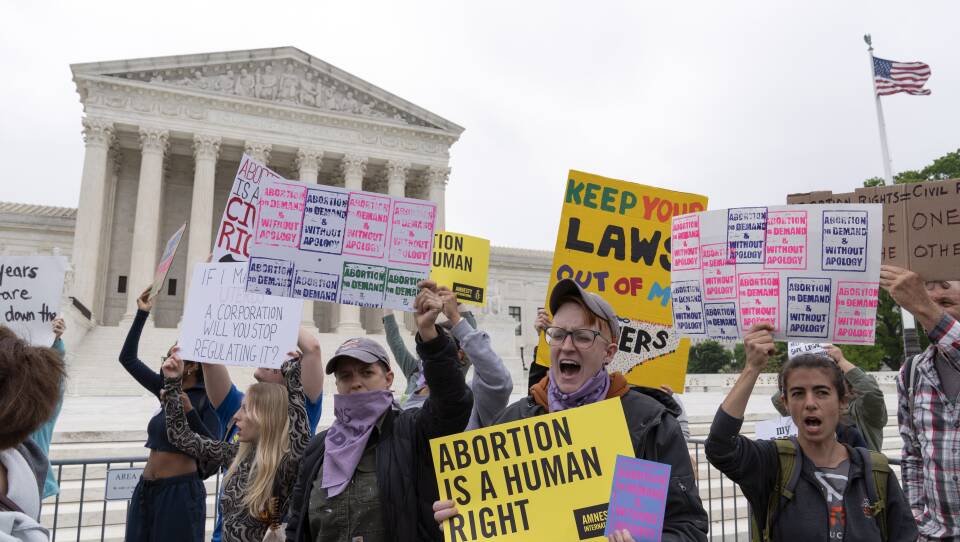Abortion may soon become illegal in some states. Politico on Monday night leaked a draft opinion penned by Supreme Court Justice Samuel Alito suggesting the court will overturn Roe v. Wade, the 1973 case legalizing abortion nationwide, and Planned Parenthood v. Casey, which upheld abortion in 1992. The rare Supreme Court leak regards Dobbs v. Jackson Women’s Health Organization, a case surrounding a restrictive Mississippi abortion law.
Judge Nancy Gertner, a retired judge for the U.S. District Court in Massachusetts, said the news caught her off guard. “I was surprised by the venom of the decision,” Gertner said on Boston Public Radio.
If the official ruling holds true to the arguments in the leaked document, it could have far-reaching effects beyond abortion. Gertner said she is worried about the broader legal implications, including what it means for birth control, interracial marriage and same-sex marriage.
“The implications of that are enormous,” Gertner said. “The reasoning really casts doubt on 50 years of constitutional law.”
In the draft opinion, Alito argues that the Supreme Court should overturn Roe v. Wade because abortion is not mentioned in the U.S. Constitution. But Gertner explained that just as abortion is not mentioned in the Constitution, neither is the right to privacy, which is the right used in Roe v. Wade to allow abortion. That same argument was referenced in following years to support rulings on other social issues.
“All of the rights that Roe v. Wade engendered — right to privacy, to birth control … lifting the ban on interracial marriage — all the rights that came about that were concerned with the right to make decisions about families without the government intervening, those rights are at risk because of the scope of this decision," Gertner said.
Gertner also had a larger issue with Alito’s argument: the fact that the Constitution does not contain many specifics at all.
“The Constitution is a very general document," she said. "Women aren't mentioned in the Constitution. The Constitution, in fact, assumes that the polity would be composed of men, and white men at that. So the fact that it is not explicitly mentioned in the Constitution doesn't say anything.”
If the Supreme Court overturns Roe v. Wade, abortion would be protected in Massachusetts
If the draft opinion becomes an official ruling, abortion laws would be left up to the states. Massachusetts has legalized abortion up to 24 weeks, and beyond 24 weeks in some cases.
“Abortion cannot be barred in Massachusetts,” Gertner said. “It is protected under the Massachusetts State Constitution.”
Some worry that Republicans will seek to make abortion illegal nationwide, which Gertner said would conflict with the Massachusetts State Constitution. In that situation, she thinks state law would win.
“We are entitled to be more protected under our Constitution than the U.S. Constitution,” she said.
Gertner gave the example of the death penalty — which is legal under federal law but illegal in Massachusetts — as a conflict where stronger state protection wins out.
“The more dangerous piece of legislation would be if Congress declares the fetus to be a human being,” she said. “That would be saying that under the Federal Constitution, the fetus would be entitled to greater protections than the woman who carries [it].”
“Could Congress pass such legislation?” she asked. “Yes. Would the president sign it? Depends on who the president is.”
Gertner thinks “there’s something wrong” with the Supreme Court
When asked her opinion on Supreme Court reform, Gertner said she thinks the current court wields too much power.
“They are doing this because they can,” she said. “They got to that position by, in my view, three illegitimate appointments. They got to the position where they had this kind of power because Trump packed the court.”
Gertner contrasted the current court with the one that ruled on Planned Parenthood v. Casey, a 1992 case that upheld Roe v. Wade.
“One reason why it was sustained in 1992 with the votes of three Republican appointed justices, was because of the sense that you don't undo, you don't take away rights,” she said.
In 2022, things have changed.
“[Justices] are proceeding to undo precedent at breakneck speed just because they can,” she said. “There's something wrong with an institution that can do that.”
Listeners recall abortions before Roe v. Wade
Boston Public Radio opened up the lines to listeners to share their reactions to the leaked decision draft.
Linda in Framingham recalled her time working in an intensive care gynecology unit in Philadelphia in the 1960s.
“The majority of my patients who were women, of course, were septic abortions, and they were because they had no safe, clean, positive experience,” she said. “It's not just about abortion. It's about giving women the opportunity to have birth control, and have lives.”
Patricia called in from San Antonio, Texas, but grew up in Massachusetts.
“I'm 74 years old. When I was 21, a senior in college, pregnant, I ended up having an illegal abortion,” she said. “I can't even talk about it now. Just awful."








